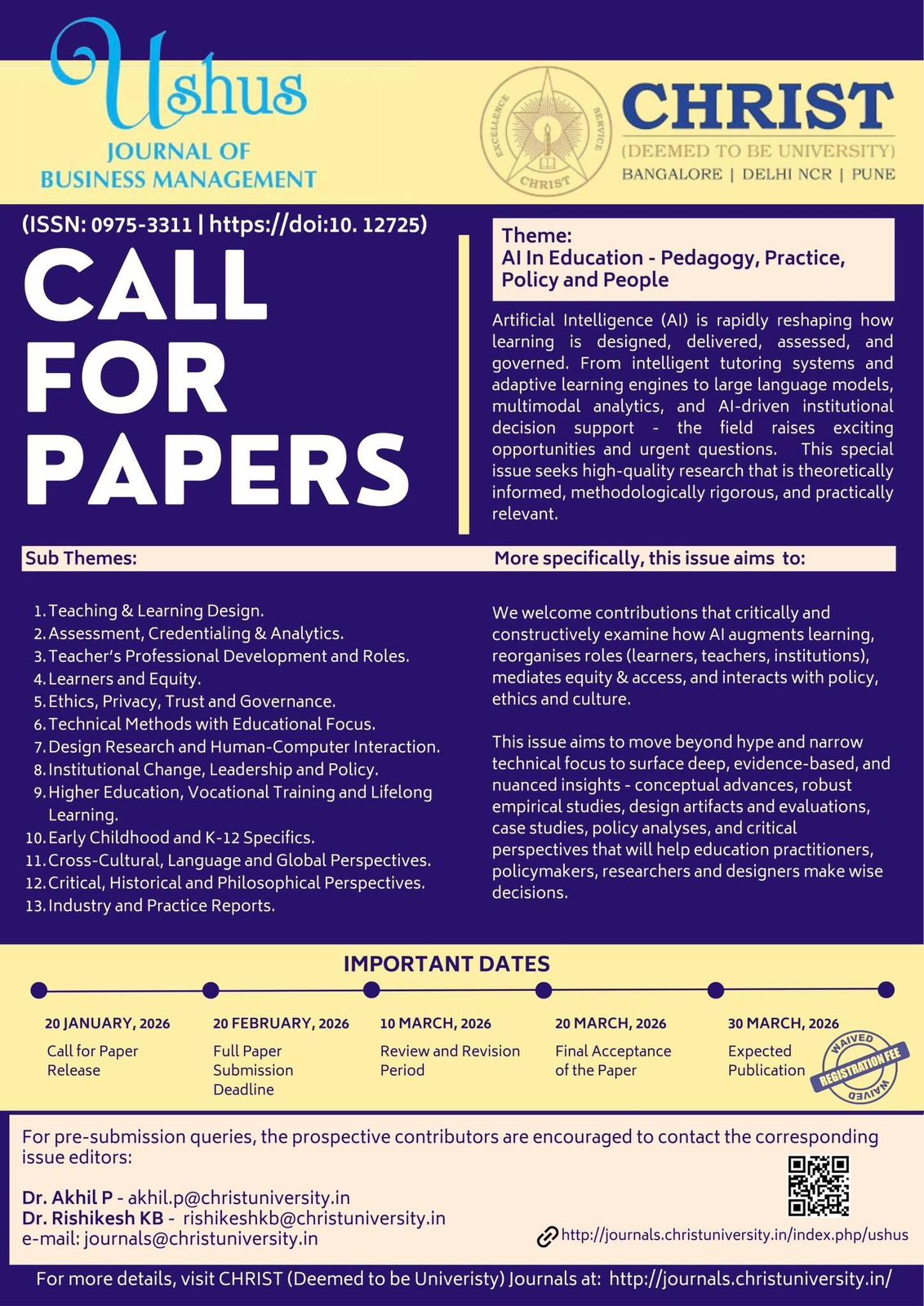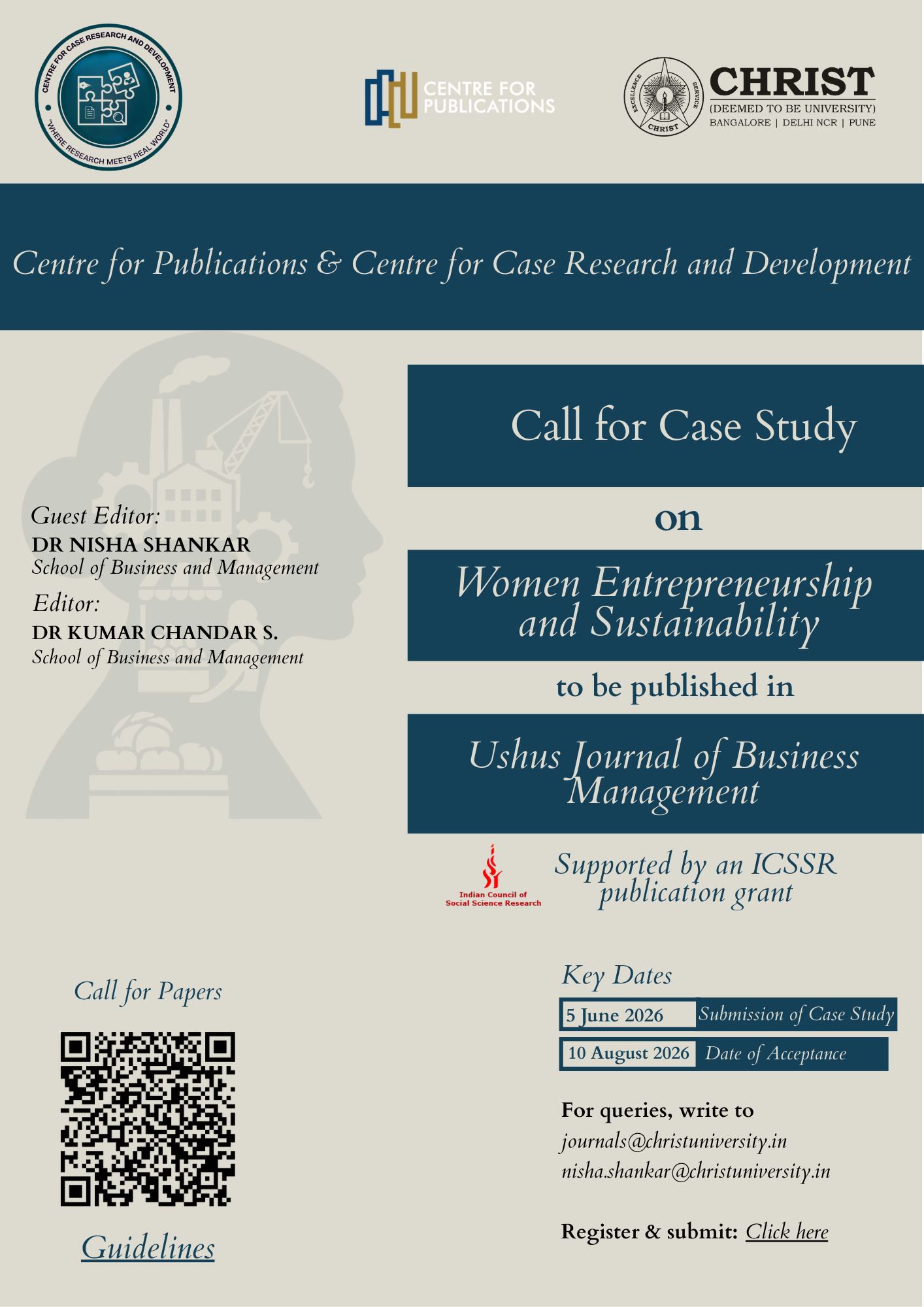The Impact of Knowledge of Sustainable Manufacturing Practices on Purchase Intention Towards Fashion Apparel
DOI:
https://doi.org/10.12725/ujbm.60.4Keywords:
Sustainability, Green Knowledge, Fashion, Sustainable Consumption, Ecological ConsciousnessAbstract
Indian apparel manufacturers are promoting sustainable fashion and reducing carbon footprint. Despite these efforts, the acceptance of green apparel in India is low compared to developed countries. In the current study, the impact of sustainable manufacturing practices on consumers’ purchase intention has been investigated while controlling for consumers' knowledge of sustainable manufacturing practices (SMPs). Data from 100 respondents analyzed using bivariate regression suggests that relationship between Consumers' Environmental Impact Consciousness, Consumers' Awareness of a brand's SMPs and their Purchase Intention toward the brand is differentially impacted by Consumers' own Knowledge of Sustainable Manufacturing Practices. The results carry implications for marketers who must craft messages to raise consumers’ knowledge of sustainable practices, as well as the consumers' awareness of brands' use of SMPs.
References
Adnan, A., Ahmad, A., & Khan, M. N. (2017). Examining the role of consumer lifestyles on ecological behavior among young Indian consumers. Young Consumers. DOI : 10.1108/yc-05-2017-00699
Brosdahl, D. J., & Carpenter, J. M. (2010). Consumer knowledge of the environmental impacts of textile and apparel production, concern for the environment, and environmentally friendly consumption behavior. Journal of textile and apparel, technology and management, 6(4).
Claudio, L. (2007). Waste couture: Environmental impact of the clothing industry. Environ Health Perspect. 2007 Sep; 115(9): A449–A454. DOI: 10.1289/ehp.115-a449
Cochran, W. G. (1977). Sampling techniques (3rd edition). New York: John Wiley & Sons, Inc, 327-58.
Connell, K. Y. H. (2010). Internal and external barriers to eco‐conscious apparel acquisition. International Journal of Consumer Studies, 34(3), 279-286. DOI: 10.1111/j.1470-6431.2010.00865.x
Decarbonising Fashion. (2021, June). United Nations Climate Change. https://unfccc.int/sites/default/files/resource/Milestones.pdf
Diamantopoulos, A., Schlegelmilch, B. B., Sinkovics, R. R., & Bohlen, G. M. (2003). Can socio-demographics still play a role in profiling green consumers? A review of the evidence and an empirical investigation. Journal of Business research, 56(6), 465-480. DOI : 10.1016/S0148-2963(01)00241-7
Dixit, J. S., Alavi, S., & Ahuja, V. (2020). Measuring consumer brand perception for green apparel brands. International Journal of E-Business Research (IJEBR), 16(1), 28-46.
Gazzola, P., Pavione, E., Pezzetti, R., & Grechi, D. (2020). Trends in the fashion industry. The perception of sustainability and circular economy: A gender/generation quantitative approach. Sustainability, 12(7), 2809. DOI:10.3390/su12072809
Hu, J., Xiao, Z., Zhou, R., Deng, W., Wang, M., & Ma, S. (2011). Ecological utilization of leather tannery waste with circular economy model. Journal of Cleaner Production, 19(2-3), 221-228. DOI : 10.1016/j.jclepro.2010.09.018
Hustvedt, G., & Bernard, J. C. (2008). Consumer willingness to pay for sustainable apparel: The influence of labelling for fibre origin and production methods. International Journal of Consumer Studies, 32(5), 491-498. DOI : 10.1111/j.1470-6431.2008.00706.x
Ketelsen, M., Janssen, M., & Hamm, U. (2020). Consumers’ response to environmentally-friendly food packaging- A systematic review. Journal of Cleaner Production, 254, 120123. DOI : 10.1016/j.jclepro.2020.120123
Khare, A., & Kautish, P. (2020). Cosmopolitanism, self-identity, online communities and green apparel perception. Marketing Intelligence & Planning. DOI 10.1108/MIP-11-2019-0556
Ki, C. W., Park, S., & Ha‐Brookshire, J. E. (2021). Toward a circular economy: Understanding consumers' moral stance on corporations' and individual creating a circular fashion economy. Business Strategy and the Environment, 30(2), 1121-1135. DOI: 10.1002/bse.2675
Kim, H. S., & Damhorst, M. L. (1998). Environmental concern and apparel consumption. Clothing and Textiles Research Journal, 16(3), 126-133. DOI: 10.1177/0887302X9801600303
Ko, E., & Sun, Y. (2016). Influence of sustainable marketing activities on customer equity. Journal of Global Scholars of Marketing Science, 26(3), 270-283. DOI: 10.1080/21639159.2016.1174537
Kuder, G. F., Richardson, M. W. The theory of the estimation of test reliability. Psychometrika 2, 151–160 (1937). DOI: 10.1007/BF02288391
Lee, S. (2011). Consumers’ value, environmental consciousness, and willingness to pay more toward green-apparel products. Journal of Global Fashion Marketing 2 (3): 161–169. DOI : 10.1080/20932685.2011.10593094
Noh, M., & Johnson, K. K. (2019). Effect of apparel brands’ sustainability efforts on consumers’ brand loyalty. Journal of Global Fashion Marketing, 10(1), 1-17.
Nunnally, J. C. & Bernstein, I. H. (1994), Psychometric Theory (3rd edition). McGraw Hill, New York, NY.
O’Rourke, D. (2014). The science of sustainable supply chains. Science, 344(6188), 1124-1127. DOI: 10.1126/science.1248526
Otto, S., Strenger, M., Maier-Nöth, A., & Schmid, M. (2021). Food packaging and sustainability–Consumer perception vs. correlated scientific facts: A review. Journal of Cleaner Production, 298, 126733. DOI : 10.1016/j.jclepro.2021.126733
Podsakoff, N. P. (2003). Common method biases in behavioral research: A critical review of the literature and recommended remedies. Journal of applied psychology, 88(5), 879-903. DOI: 10.1037/0021-9010.88.5.879
Saxena, A., & Khare, A. K. (2019). Awareness of Green Manufacturing in Apparel Industry. In Functional Textiles and Clothing (pp. 371-382). Springer, Singapore.
Strähle, J., & Köksal, D. (2015). Impact of brand and country image on the perception of sustainability in the fashion business. DOI : 10.34645/opus-552
Tan, S. (2009). Misuses of KR-20 and Cronbach's alpha reliability coefficients. Egitim ve Bilim, 34(152), 101.
United Nations Alliance for Sustainable Fashion. (2020). Retrieved from https://unfashionalliance.org
Van Birgelen, M., Semeijn, J., & Keicher, M. (2009). Packaging and proenvironmental consumption behavior: Investigating purchase and disposal decisions for beverages. Environment and Behavior, 41(1), 125-146. DOI: 10.1177/0013916507311140
Yang, L., & Dong, S. (2017). Sustainable product strategy in apparel industry with consumer behavior consideration. Sustainability, 9(6), 920. DOI : 10.3390/su9060920
Downloads
Published
How to Cite
Issue
Section
License
Copyright (c) 2022 Bhavna Bajaj, Ann Paul

This work is licensed under a Creative Commons Attribution-NonCommercial-NoDerivatives 4.0 International License.



